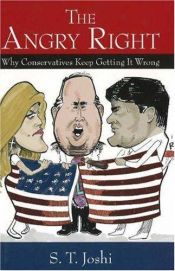The Angry Right: Why Conservatives Keep Getting It Wrong
Blurb
Since 1968, Republican presidents have occupied the White House far longer than Democratic presidents, and recently Republicans have controlled both houses of Congress as well. In spite of these electoral triumphs, leading spokespersons on the right continue to depict conservatives as an embattled minority. Lashing out at their liberal opponents, sharp-tongued partisan advocates like Rush Limbaugh, Ann Coulter, and Sean Hannity never tire of issuing jeremiads against what they perceive as the inexorable tide of liberal abuses that threatens to overwhelm the Republic.But if Republicans have won the battle at the voting booths, why is the right so angry?
As S. T. Joshi reveals in this incisive profile of twelve leading conservatives, the rage at the heart of the right is fueled by a gnawing sense that conservatives long ago lost the hearts and minds of the American people. Since the F.D.R. administration, conservatives have unsuccessfully opposed legislative and judicial reforms that today are considered so mainstream as to be, well, "conservative." In effect, yesterday’s liberalism is today’s conservatism, and this has been the direction of social and political change since the age of the Model T.
Examining the writings of such conservative icons as Russell Kirk, William F. Buckley Jr, Phyllis Schlafly, and nine others, Joshi uncovers statements that most people today would consider not just radical but outrageous:
In the 1950s, Russell Kirk opposed Social Security because he said it was "un-Christian."
In the same decade, William F. Buckley Jr. argued against the desegregation of public schools on the grounds that it would be an infringement of states’ rights (an argument also used a century earlier to defend slavery).
In the 1970s, Phyllis Schlafly declared that women’s liberation is a "disease" and a "homewrecker."
Knowing that these positions are today indefensible, conservative spokespersons have little recourse but to engage in passionate invective that attempts to portray their opponents as extremists. Joshi characterizes the aggrieved lament of conservatives as the last gasp of those who know their ideas will be confined to the dustbin of history.

 English
English Español
Español Deutsch
Deutsch










Member Reviews Write your own review
Be the first person to review
Log in to comment